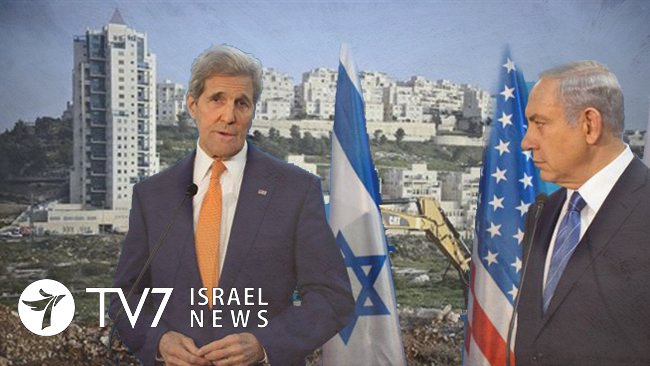Prime Minister Benjamin Netanyahu, appearing via satellite from Jerusalem to an annual conference of the Saban Center for Middle East Policy of the Brookings institute in Washington, declared that the building of Israeli settlements in the West Bank was not the source of the conflict between Israel and the Palestinians, thus should not be an obstacle to advancing peace. “The question of settlements and I think is an issue that has to be discussed in peace negotiations but I disagree and I’ve always disagreed that this is the source of the conflict. You know this, this conflict raged for 50 years, that’s half a century, before there were any Jewish communities in Judea Samarian. 50 years. PLO was founded in 1964 three years before the Six-Day War before we entered the territories of Judaism Samaria in Gaza. We then left Gaza and they fired 20000 rockets on our head and continue to build terror tunnels,” Netanyahu said.
US Secretary of State John Kerry rejected the statement made by Prime Minister Benjamin Netanyahu, stressing that he believed settlements were an obstacle to peace. “I just very respectfully of Bibi and I have had long arguments about this and long discussions about it. I don’t agree with him that the settlements are not an obstacle to peace. Now does that mean as I said I want to go back to what I said earlier, they are not the cause of the conflict. So if Bibi says the settlements aren’t the cause of this conflict I agree they’re not the cause of it. But as I said to you earlier folks if you have a whole bunch of people who are specifically strategically locating outposts and settlements in areas that make it impossible to have a contiguous Palestinian state they’re doing it for the specific purpose of not having a peace. That affects the peace,” Kerry said.
Israeli Defense Minister Avigdor Lieberman, who also took part in the Saban conference, revealed that the only reason Israel had de-facto frozen Israeli construction in Jerusalem and the West Bank, which Lieberman referred to with its biblical name ‘Judea and Samaria’, was due to disagreements with the Obama Administration – a reality he said would likely change under the new administration of President-elect Donald Trump. “The reason that we freeze and de facto you know our construction activity in Judea and Samaria and in Jerusalem it’s really… I’m personally not satisfied and the main reason it’s not because we really don’t want to build new homes in Judea and Samaria or in Jerusalem because we had disagreements with the American administration. And I think it’s clear for us, for me at least, that key to the future of the settlements is understandings with the United States not only our desire, we’re not in a vacuum. And I think the last eight years it was a huge problem, it was one of the main points of disagreements between us and the current administration,” Lieberman said.
Lieberman also expressed hope for a common vision with Washington, under the new administration, regarding the future of the Middle East at large – emphasizing that only a strong America can stabilize the chaotic region. “We need a strong America, we need America active at least in our region, and I hope that we will really achieve some, you know, we will agree about the common vision regarding future of the Middle East,” Lieberman said.
